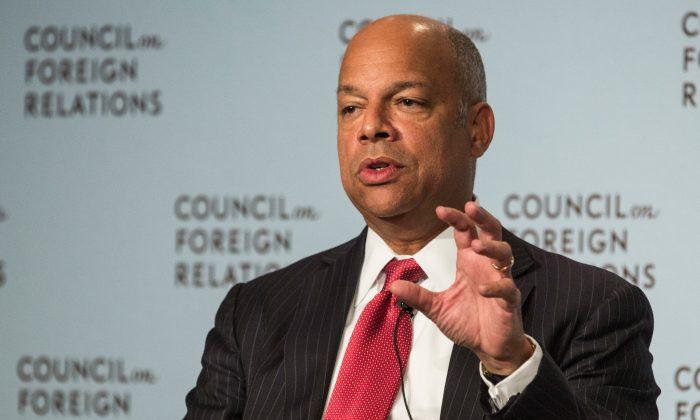WASHINGTON—President Obama announced a new national space policy on Monday. The policy emphasizes international cooperation for sustainable use and free access to space for all nations.
No longer does the United States seek dominance in space, because, “no longer are we racing against an adversary,” said President Obama in a statement released by the White House on Monday.
In the same statement Obama said that one of the United States’ central goals is promoting peaceful cooperation and collaboration in space. He says this will not only prevent conflict, but will increase operating capability in orbit and beyond.
The new national space policy’s emphasis on international cooperation is reminiscent of Clinton-era space policy, says Dr. Ray Williamson, executive director of the Secure World Foundation. He spoke with The Epoch Times by phone.
But Williamson also sees the new policy as going beyond past space policy, with the current administration stepping forward to lead the way in international space cooperation and collaboration.
He says one indicator in the policy of greater willingness to work closely with other nations can be found in the guidelines for enhancing positioning, navigation, and timing systems. Here the policy states that foreign positioning, navigation, and timing services can be used “to augment and strengthen the resiliency of GPS”(global positioning system).
This is important because GPS has several civil and national security uses. Dr. Williamson says this level of collaboration is new within GPS systems and could be important in savings lives (for example ambulances use GPS for navigation).
Another of the core principles listed in the new national space policy is that the United States will “assure the use of space for all responsible parties,” through a “variety of measures.”
The policy states that “all nations have the right to explore and use space for peaceful purposes” and the benefit of all humanity as long as they follow international law.
Maintaining sustainability of space use is a high priority in the new policy, and it is of vital national importance to the United States to maintain the “sustainability, stability, and free access to, and use of, space.”
The Secure World Foundation’s Dr. Williamson, who is also concerned with maintaining the sustainable use of space, pointed out the importance of maintaining stability—we rely heavily on satellites.
In addition to data transfer, international broadcasting, cell phone communication, weather pattern modeling, and global positioning systems, satellites also measure things such as soil moisture, which can be used to warn of possible drought.
Commercial Space Industry
The policy also encourages developing a stronger and internationally competitive commercial space sector. The administration finds such an industry a key to continued progress in space.
“The United States is committed to encouraging and facilitating the growth of a U.S. commercial space sector that supports U.S. needs, is globally competitive, and advances U.S. leadership in the generation of new markets and innovation-driven entrepreneurship.“
No longer does the United States seek dominance in space, because, “no longer are we racing against an adversary,” said President Obama in a statement released by the White House on Monday.
In the same statement Obama said that one of the United States’ central goals is promoting peaceful cooperation and collaboration in space. He says this will not only prevent conflict, but will increase operating capability in orbit and beyond.
The new national space policy’s emphasis on international cooperation is reminiscent of Clinton-era space policy, says Dr. Ray Williamson, executive director of the Secure World Foundation. He spoke with The Epoch Times by phone.
But Williamson also sees the new policy as going beyond past space policy, with the current administration stepping forward to lead the way in international space cooperation and collaboration.
He says one indicator in the policy of greater willingness to work closely with other nations can be found in the guidelines for enhancing positioning, navigation, and timing systems. Here the policy states that foreign positioning, navigation, and timing services can be used “to augment and strengthen the resiliency of GPS”(global positioning system).
This is important because GPS has several civil and national security uses. Dr. Williamson says this level of collaboration is new within GPS systems and could be important in savings lives (for example ambulances use GPS for navigation).
Another of the core principles listed in the new national space policy is that the United States will “assure the use of space for all responsible parties,” through a “variety of measures.”
The policy states that “all nations have the right to explore and use space for peaceful purposes” and the benefit of all humanity as long as they follow international law.
Maintaining sustainability of space use is a high priority in the new policy, and it is of vital national importance to the United States to maintain the “sustainability, stability, and free access to, and use of, space.”
The Secure World Foundation’s Dr. Williamson, who is also concerned with maintaining the sustainable use of space, pointed out the importance of maintaining stability—we rely heavily on satellites.
In addition to data transfer, international broadcasting, cell phone communication, weather pattern modeling, and global positioning systems, satellites also measure things such as soil moisture, which can be used to warn of possible drought.
Commercial Space Industry
The policy also encourages developing a stronger and internationally competitive commercial space sector. The administration finds such an industry a key to continued progress in space.“The United States is committed to encouraging and facilitating the growth of a U.S. commercial space sector that supports U.S. needs, is globally competitive, and advances U.S. leadership in the generation of new markets and innovation-driven entrepreneurship.“





Friends Read Free